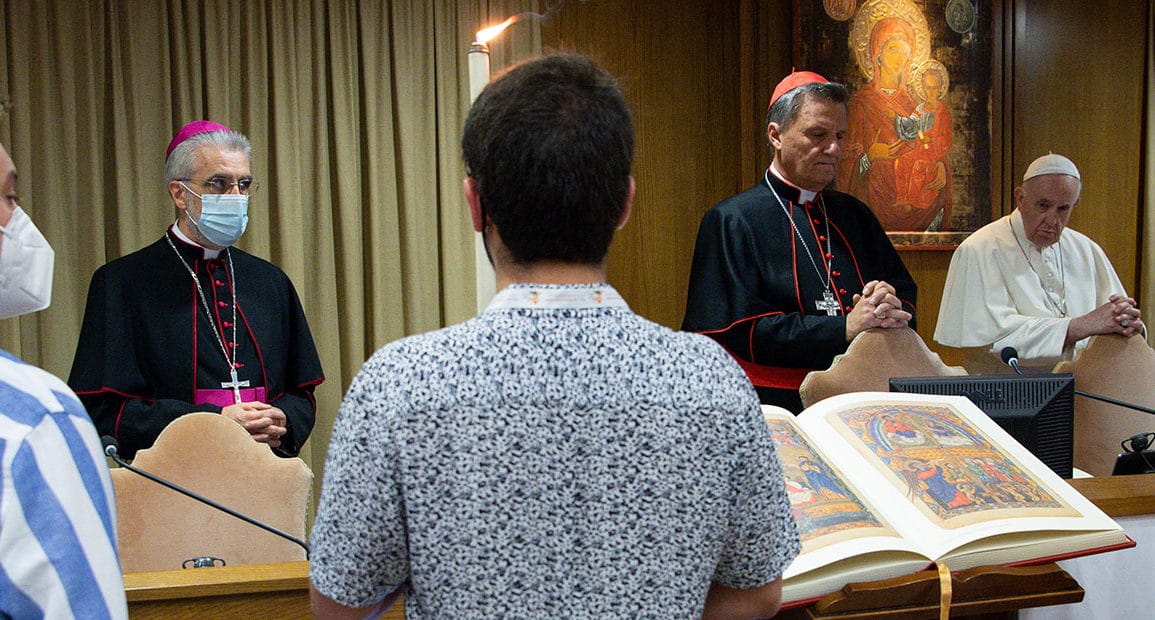Enrique Soros, social communicator, offers Part II of the article “The Church Faces the Synodal Challenge,” in which he explains how the synodal spirit is possible despite the different visions.
* * *
The Synod of Bishops on Synodality presents to the Church a historic opportunity: to be a transition between a Church that has an answer for everything to a Church that, in the first place, listens; between a Church that sates Roma locuta, causa finita, and a Church that embraces, that goes in search of those that are on the periphery, which opens her heart to all.
Today we are faced with this duality. However, this isn’t a problem in itself, if it’s only about different perspectives, even if at times they are somewhat radical. Dissent awakens creativity in noble people. It’s an opportunity to educate one’s personality and to discover the points of unity in the midst of dissent.
We Cannot Be Church Without a Synodal Spirit
A serious problem is when one position confronts another and division is generated. This fact is expressed clearly when the Pope is attacked violently because he doesn’t express what someone judges to be the only valid point of view. Such an attitude divides, gravely injures the unity of the Church, and closes itself to a vision of the Church as synodal, as family.
Gaudete et Exsultate
In the second chapter of his Apostolic Exhortation Gaudete et Exsultate, Rejoice and Be Glad, Pope Francis summarizes courageously and clearly two enemies of holiness. He defines mechanistic thinking, which makes it impossible to understand and assess the contexts, the complex reality.
On Gnosticism
One of these enemies is present-day Gnosticism. He expresses this by saying that “Gnosticism implies a faith enclosed in subjectivism, where one is only interested in a specific experience or a series of reasonings and knowledge that supposedly give comfort and illumine but, in fact, the individual remains closed in the immanence of his own reason or feelings (EG).” GE 36.
On Pelagianism
In regard to “Pelagians,” Pope Francis says that “. . . deep down, they only trust their own strengths and feel superior to others for complying with specific rules or for being unbreakably faithful to a certain Catholic style. When some of them address the weak, saying to them that everything is possible with God’s grace, deep down they usually transmit the idea that everything is possible with the human will as if it were something pure, perfect, omnipotent, to which grace is added. They tend to ignore that not everyone can do everything and that in this life human frailties are not completely and definitively healed by grace.” (Cf. last phrase: St. Thomas Aquinas). EG 49.
Organic, Synodal Thinking
Being aware that not everything is possible with the human will, we can be empathic with the reality of the other, understand him in his personal experience, listen to him, embrace him and invite him to be part of a Church that welcomes him.
Pope Francis responds to the deviations posed by presenting the Beatitudes in chapter three of Gaudete et Exsultate. It’s always the path of humility that enables one to find the ways of God, of unity, of community. “Blessed are the poor in spirit, blessed are the meek, blessed are the merciful, blessed are the clean of heart, blessed are those that work for peace . . . “
A meek and merciful heart is open to listening, to a diversity of thought, and is conscious that the truth is more complex than he thought.
The Ecclesial Assembly of Latin America and the Caribbean
That was the path taken last week by the one thousand assembly members of the Ecclesial Assembly of Latin Ameri, 100 in person from Mexico City and 900 virtually, from the entire American Continent. It is hoped that the 12 Pastoral Challenges that the Assembly agreed to on the Assembly’s last day, will serve as inspiration for a profound implementation of the spirit of Aparecida in Latin America and the Caribbean and that the synodal process carried out will be a contribution to the synodal spirit of the universal Church.
The Synodal Spirit Is Possible Between Seriously Divergent Visions
In this connection, in his address in the mentioned Ecclesial Assembly, Cardinal Mario Grech, Secretary-General of the Synod of Bishops on Synodality, expressed the marked differences of perspective, pointing out that “another aspect has characterized the ecclesial life of this Continent, for at least thirty years: the radical contrast between the two visions of the Church, which has given place to a profound division of the ecclesial body . . . The Synod asks us to walk together. A missionary conversion won’t be possible if a synodal conversion isn’t carried out, which implies the humble and respectful listening of the other and of his reasons; that has the courage to ask for and give pardon; which wants unity not at the cost of the truth, but that never identifies the truth with ‘my’ truth. Perhaps this is the greatest effort, but it will also be the strongest testimony, which will give content to the gift of the synodal experience that they can offer the whole Church.”
In the previous presentation, we analyzed the two key priorities of the 12 Pastoral Challenges of the Church of Latin America and the Caribbean, as the conclusion of the Ecclesial Assembly. In the next part, we will address the 12 proposals.
Translation by Virginia M. Forrester










